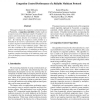Free Online Productivity Tools
i2Speak
i2Symbol
i2OCR
iTex2Img
iWeb2Print
iWeb2Shot
i2Type
iPdf2Split
iPdf2Merge
i2Bopomofo
i2Arabic
i2Style
i2Image
i2PDF
iLatex2Rtf
Sci2ools
136
click to vote
ICNP
1998
IEEE
1998
IEEE
Congestion Control Performance of a Reliable Multicast Protocol
This paper evaluates the congestion control performance of Pseudofed, a congestion-controlled, reliable multicast transport protocol for bulk data transfer. Pseudofed's congestion control mechanism is based on the concept of representatives, a small, dynamic set of multicast group members. By reducing the congestion control problem to a bounded set of receivers, representatives allow the pointto-point congestion control model used by unicast protocols like TCP to scale to larger multicast groups. Other features that contribute to the scalability of Pseudofed's congestion control algorithm are: (1) attempting to distinguish between correlated and uncorrelated packet losses, (2) not requiring complete knowledge of the multicast group, and (3) not exchanging control communication with congestionfree subtrees.
Computer Networks | Congestion Control | ICNP 1998 | Multicast Group | Pseudofed's Congestion Control |
Related Content
| Added | 04 Aug 2010 |
| Updated | 04 Aug 2010 |
| Type | Conference |
| Year | 1998 |
| Where | ICNP |
| Authors | Dante DeLucia, Katia Obraczka |
Comments (0)

